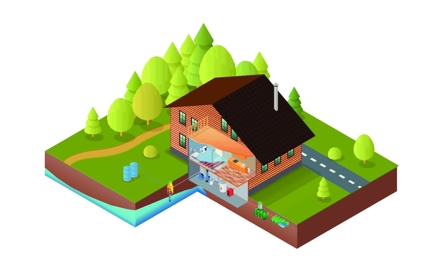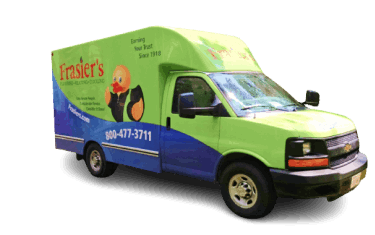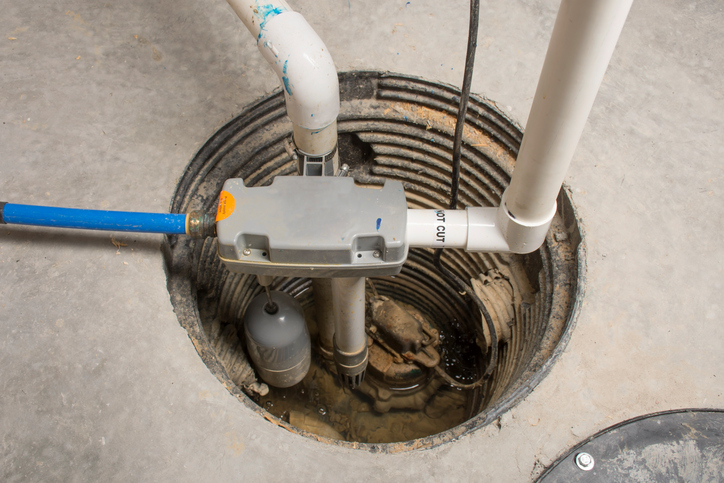How Stay-At-Home Orders Are Impacting Your Septic System

The water you use eventually returns to the environment in one form or another. Whether it’s taking a shower, washing the dishes, or flushing the toilet, the water will always find its way back into our ecosystem after it has undergone treatment in a wastewater facility. We don’t think about this process all that often, but the truth is that for many this process is invaluable and vital to the health of their property. This is because their wastewater treatment system is not necessarily a public option, but rather a private one known as a Private Onsite Wastewater Treatment System, or septic system for short. These systems use soil to treat water, eliminating disease-causing viruses and other organisms so that the water that re-enters the natural water table doesn’t harm our natural drinking supply.
However, your septic system can only do this so long as it isn’t overloaded with too great of a workload. An overworked septic system can be prone to all kinds of problems, including jams and clogs, leaks, and much more. However, a few bad habits we may have could also cause some serious issues for your septic system. In this blog, we’ll offer a few tips for things you should do to keep your septic system in good health while sheltering-in-place during COVID-19, as recommended by the Wisconsin Department of Safety and Professional Services.
Keep an Eye on Your Septic System’s Health
If your septic system has a problem, it will tell you. However, you need to know what you’re looking for in order to understand what it is trying to say. This means now perhaps more than ever is an extremely important time to be keeping an eye on your septic system and looking for symptoms of a problem.
Here are a few examples:
- Wastewater flowing from a pipe or hose up to your ground surface. This is a sign that the waste in your system is not being treated properly, and thus viruses (possibly including COVID-19) are not being treated as they should be. This is because that wastewater flowing to the surface is raw sewage, and sewage means contamination that could spread quickly. Keep your eyes and nose open for possible signs of sewage leaking onto your property.
- Issues with drains throughout your home. A blockage in one drain isn’t necessarily a sign that you have a problem with your septic system, however slow-moving drains around your home could very well be a sign that your septic system is nearing capacity. Septic tanks need to be pumped every few years or so, and one of the first signs to give away that your tank is nearing capacity is slow-moving drains. Likewise, if you see wastewater flowing back up your drains, then you absolutely should call to have your septic system inspected right away.
- It has been several years since you last had your septic tank pumped. Depending on your home, the size of your septic tank, and a few other important factors, there’s a chance it may be time to have your septic tank pumped. If you suspect your tank is either approaching this deadline, may have passed this deadline, or you aren’t sure when it was last pumped, then call for a professional inspection right away; you need to have your tank checked as soon as possible.
Avoid Potential Septic Snafus or Problems
During the COVID-19 pandemic, we’ve heard and seen a lot of strange stories about things people are doing to try and make up for shortages or compensate for things they run out of. This is particularly true when it comes to sanitation problems. Toilet paper is becoming a hot commodity, and we’ve unfortunately seen too many stories about people using things like facial tissue and paper towels as substitutes. These things not only block up your drain lines, but don’t decompose in your septic tank, so they’ll contribute to clogging and other problems in the long term as well.
Likewise, it’s also important to think about what kinds of liquid wastes you’re putting down the drains, as they’ll impact your septic system too. Septic tanks use naturally-occurring bacteria to decompose the waste we put into them and treat the water so it’s safe to return to the water table. That means antibacterial soaps and disinfectants actually harm your septic waste treatment system.
Here are a few tips:
- Use hand soaps that are not antibacterial. Regular soap does the same job and doesn’t stress or destroy the good bacteria your tank needs. Use hand sanitizer after washing your hands, as it does not need to be flushed down the drain.
- Don’t use a garbage disposal. Garbage disposals generate food waste that is far too heavy on the organic load in your septic system.
- Limit showers, laundry loads, and heavy water usage activities to the fewest number possible. This keeps your water processing level in balance.
Lock Your Septic Manhole Cover at All Times
Finally, always, and we mean always, lock the manhole cover over your septic tank system. Unfortunately, we’ve heard a number of tragic stories of people, both children and adults, accidentally falling into the septic holding tank due to the manhole cover being dislodged or locked down tight. This accident can cause serious injury and even be fatal, and that’s a tragic consequence of a highly-preventable accident.
If your septic system experiences a problem, the team here at Frasier’s Plumbing, Heating & Cooling is here to help! We have taken a number of additional precautions to protect ourselves and our customers while providing the same great services our customers need and depend on. Give us a call at (715) 804-0947 now to schedule your appointment.


- More than 100 years of industry experience
- Family-owned and operated business
- Commitment to the community
- Friendly and professional technicians, plumbers, and electricians
- Highly-trained and experienced team
- Award-winning service
- 100% satisfaction guaranteed



